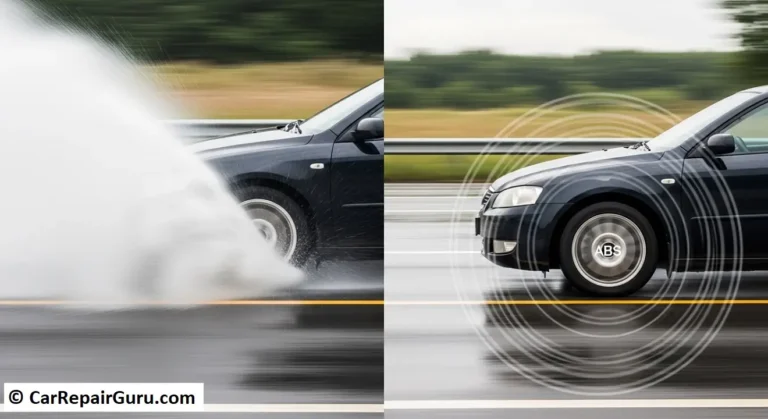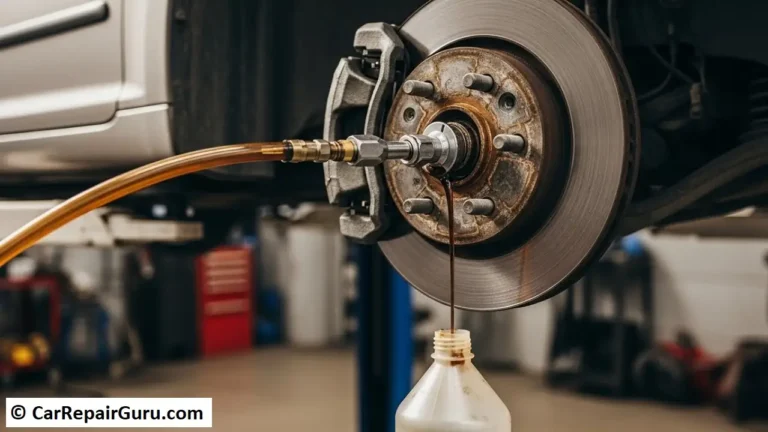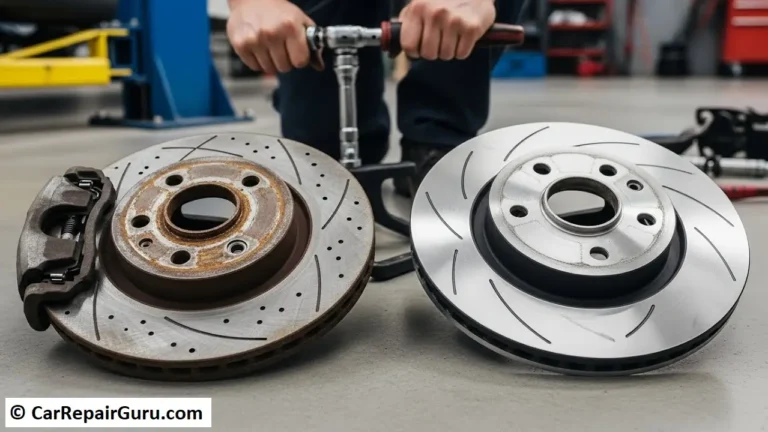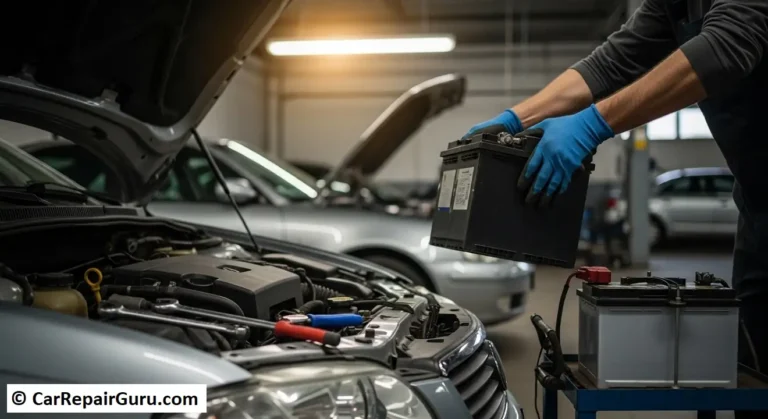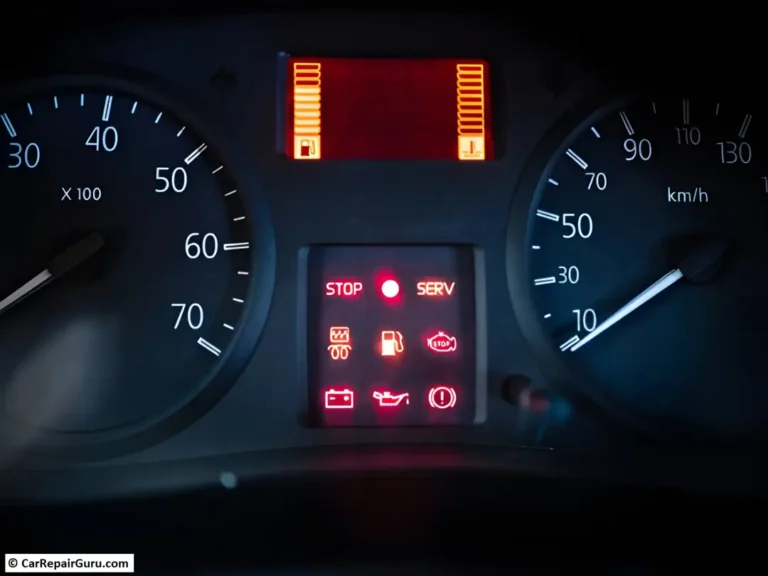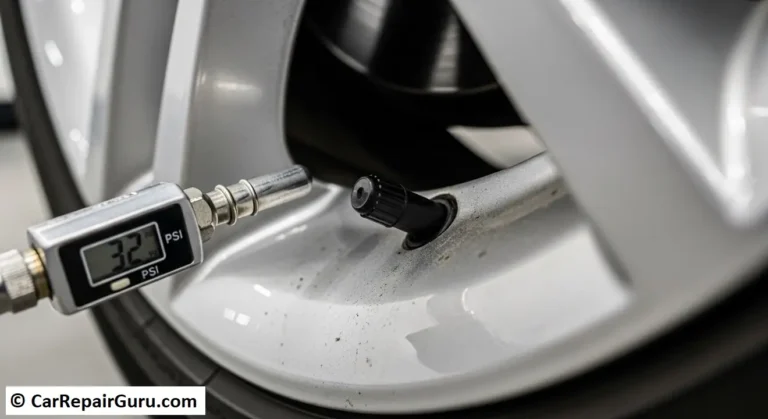
That high-pitched squeal as you pull up to a stoplight. The deep, metallic groan when you press the pedal. It’s a sound that can instantly trigger a wave of anxiety, followed by the dreaded question: “What’s wrong with my car, and how much is this going to cost?”
Brake noises are more than just an annoyance; they are your vehicle’s primary way of communicating a problem. While some sounds are harmless, others are urgent warnings that your most important safety system needs immediate attention. Ignoring them can lead to more expensive repairs and, more importantly, compromise your ability to stop safely.
This guide is here to help you decode those sounds. We’ll explore the common brake noise causes, from a simple squeak to a dangerous grind. You’ll learn what each noise means, whether it’s safe to keep driving, and what your next steps should be.
Brake Noise Cheat Sheet
- 🔊 Squeaking/Squealing: Usually a wear indicator. Plan for a brake inspection soon.
- ⚙️ Grinding: A critical warning. Metal-on-metal contact. Stop driving immediately.
- 🔩 Clicking/Clunking: Often a loose part. Inspect as soon as possible.
- ⚠️ The Golden Rule: When in doubt, get it checked out. Your safety is paramount.
Anatomy of a Brake System: Understanding the Key Components
Before diagnosing the noises, it helps to understand what’s happening when you press the brake pedal. Your car’s disc brake system works by using hydraulic force to clamp friction pads onto a spinning metal disc.
Here are the main players involved:
- Brake Pads: These are the workhorses. They are blocks of a high-friction material designed to wear down over time. They contain the wear indicator—a small metal tab that causes a squeal when the pads are low.
- Brake Rotors (Discs): These are the large metal discs that your wheels are bolted to. The brake pads clamp down on the rotors, and the friction between them stops the wheel from spinning. Rotor surfaces must be perfectly flat and smooth to work quietly and effectively.
- Brake Calipers: The caliper is the hydraulic clamp that holds the brake pads. When you press the brake pedal, hydraulic fluid pushes a piston inside the caliper, forcing the pads against the rotor.
- Shims and Hardware: These are the unsung heroes of a quiet brake system. They are small metal clips and backing plates that hold the brake pads snugly, dampening vibrations that cause squealing and rattling.
The Different Types of Brake Noises and What They Mean

Now that you know the parts, let’s connect them to the sounds. Every noise tells a different story about what’s happening at your wheels.
High-Pitched Squeaking or Squealing
This is by far the most common brake noise. A high-frequency squeal is irritating but often serves as an early warning.
- The Cause: The most likely culprit is the brake wear indicator. This is a small metal tab on the brake pad that contacts the rotor when the pad material wears down to a minimum thickness, creating that distinct squeal. It’s your car’s built-in alarm system saying, “Time to schedule a brake service soon!”
- Other Causes:
- Morning Moisture: A thin layer of rust can form on rotors overnight or after a car wash, causing a squeak for the first few stops until it’s wiped clean. This is normal.
- Glazed Pads/Rotors: Intense heat from hard braking can harden and crystallize the surface of the pads and rotors, causing a squeal.
- New Brake Pads: It’s common for new brakes to make some noise during their “bedding-in” period (the first 100-200 miles) as the pad material transfers to the rotor.
- What to Do: If the squeal is persistent every time you brake, it’s the wear indicator. Schedule a brake inspection within the next week or two.
Deep, Metallic Grinding
If a squeal is a polite request, a grinding noise is a desperate scream for help. This is the most serious brake sound you can hear.
- The Cause: A loud, continuous grinding sound when stopping means you have likely worn completely through your brake pad material. The noise you’re hearing is the metal backing plate of the pad grinding directly against the metal rotor. This is a critical metal-on-metal situation that severely reduces your stopping power.
- Other Causes: A rock or other hard debris can become wedged between the rotor and the caliper, also producing a horrific grinding sound.
- What to Do:
⚠️ Urgent Safety Warning: STOP DRIVING THE VEHICLE. Driving with grinding brakes is incredibly dangerous. You will not be able to stop effectively in an emergency. Have your vehicle towed to a repair shop to prevent catastrophic failure and much more expensive repairs.
Clicking or Ticking Noise
A rhythmic clicking or ticking sound often points to something being loose or out of place.
- The Cause: The most common cause is movement in the brake pads. The hardware (shims and clips) that holds the pads tightly in the caliper may be worn, broken, or missing, allowing the pad to shift and “click” when the brakes are applied or released.
- What to Do: While not as immediately dangerous as grinding, this issue should be addressed soon. A loose component can lead to uneven pad wear and potential damage. A mechanic will need to inspect the assembly to secure or replace the hardware.
Rumbling or Vibration (Judder) in the Pedal
This isn’t just a sound; it’s a feeling. When you brake, you feel a pulsing or vibration through the brake pedal or steering wheel.
- The Cause: The primary reason for this is warped brake rotors. Intense heat from braking can cause the flat metal of the rotor to develop slight high and low spots. When the pads clamp down on this uneven surface, they grab and release rapidly, creating the shuddering sensation.
- What to Do: The fix for warped rotors is either to “resurface” them (machining them flat) or to replace them entirely. Resurfacing is only possible if the rotors are still thick enough to remain within a safe tolerance.
Common Culprits Beyond Normal Wear and Tear
Sometimes, brake noise isn’t just about worn-out pads. Other factors can contribute to a noisy stop.
- Environment: Living in a coastal area or the “salt belt” promotes rust and corrosion, which can cause calipers to stick and rotors to become noisy.
- Brake Dust: Low-quality pads with high metallic content create excessive dust that can build up and contribute to squeaking.
- Improper Installation: A common cause for noise from new brakes is a poor installation. If a mechanic fails to clean and lubricate caliper slide pins or doesn’t install anti-rattle hardware correctly, noise is almost guaranteed.
- Low-Quality Parts: Cheaper brake pads often use inferior friction materials and lack the noise-dampening shims found on premium parts, making them inherently noisier.
Tips to Keep Your Brakes Quiet and Safe
You can extend the life of your brakes and prevent many of these noises with a few good habits.
- ✅ Drive Gently: Avoid hard, last-second stops. Braking smoothly puts far less stress and heat on your brake system.
- ✅ Don’t Ride the Brakes: On long downhill grades, shift into a lower gear and let your engine help slow the vehicle (engine braking). This prevents your brakes from overheating.
- ✅ Schedule Regular Inspections: Ask your mechanic to perform a quick visual brake inspection every time you get your tires rotated (about every 5,000-7,000 miles).
- ✅ Invest in Quality Parts: Opt for high-quality ceramic or semi-metallic pads and new hardware. The small extra cost is well worth the improved performance and quiet operation.
- ✅ Flush Your Brake Fluid: Brake fluid absorbs moisture over time. Flushing the fluid every 2-3 years keeps the hydraulic system clean and working smoothly.
Is It Safe to Drive with Noisy Brakes? A Quick Checklist
Use this simple guide to help you decide on the right course of action.
| Safety Level | The Sound | Your Action |
|---|---|---|
| ✅ Generally Safe | A light squeak for the first few stops in the morning or after rain. A faint squeal from brand new brakes in their break-in period. | Monitor the noise. If it persists or gets worse, have it checked. |
| ⚠️ Use Caution | A persistent, high-pitched squeal that occurs every time you apply the brakes. A noticeable clicking sound when braking. | Schedule an inspection as soon as possible to diagnose the issue before it worsens. |
| 🛑 UNSAFE – STOP DRIVING | Any metallic grinding sound. A loud clunking or banging noise. The noise is accompanied by a soft pedal, a burning smell, or a noticeable loss of stopping power. | Pull over safely. Stop driving immediately and call for a tow to a repair shop. |
How to Fix Minor Brake Noise vs. When to Call a Pro

While some car maintenance is DIY-friendly, brakes are a safety system where caution is paramount.
Simple DIY Checks
- Visual Inspection: With your car parked, you can sometimes see the outer brake pad’s thickness through the spokes of your wheel. If it looks very thin (less than ¼ inch), it’s time for a change.
- Clean Your Wheels: A pressure washer can sometimes dislodge a small rock or debris causing noise, but this is a long shot.
When to Call a Certified Mechanic
- If you hear grinding, clunking, or feel a vibration.
- If your brake pedal feels different (spongy, hard, or goes too low).
- If you are not 100% confident in your ability to safely diagnose and repair your own brakes.
Your Brakes Are Your Most Important Safety Feature
The noises your brakes make are a direct line of communication. By learning to understand these sounds, you can move from a state of worry to one of informed action. While some noises are minor, others are critical warnings.
Listen to your car, trust your instincts, and never compromise on safety. If you’re experiencing any of the concerning brake noise causes we’ve discussed, don’t wait. Schedule a professional brake inspection today and drive with the peace of mind that comes from knowing you can stop safely and quietly every time.
Frequently Asked Questions About Brake Noise
Why do my brakes only squeak in reverse?
This is often caused by high-frequency vibrations in the pads and calipers that are more pronounced when moving backward. While usually not a sign of a major problem, it’s worth mentioning at your next service.
Is it normal for new brakes to make noise?
Yes, a light squeal can be normal during the first 100-200 miles as part of the “bedding-in” process. However, a loud grinding sound from new brakes is not normal and indicates an installation error. Return to the shop immediately.
How much does it cost to fix squeaky brakes?
The cost can range from a minor adjustment to a full replacement. A typical brake pad and rotor replacement can cost anywhere from $250 to over $700 per axle, depending on your vehicle and the parts used.
Can I just spray something on my brakes to stop the squeaking?
Absolutely not. Never spray any lubricant like WD-40 on the face of your brake pads or rotors. This is extremely dangerous as it will eliminate the friction needed to stop your car.
